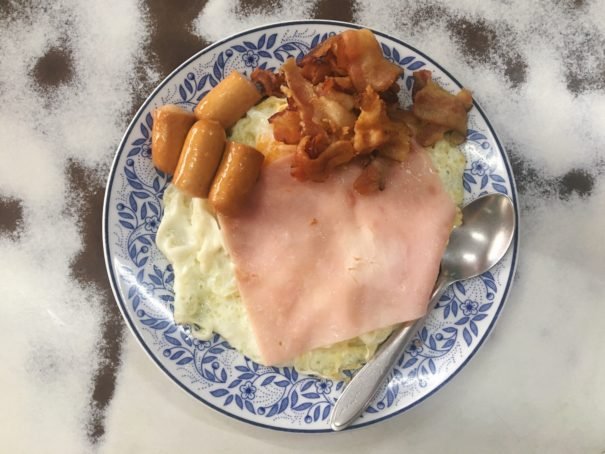
Nothing Tastes Like Home Like Suspicious Diner Food

Nothing Tastes Like Home Like Suspicious Diner Food
American breakfast in Bangkok
The cab drops me off at the inconspicuous shopfront of an open-air café in Bangkok’s Chinatown. Since moving here four months ago, I’ve taken to spending my mornings at the city’s various old-style coffee shops for kafeh yen (Thai iced coffee) and kaya toast.
On Luk Yun, an 80-year-old establishment, serves the usual fare, but today
I’ve come for their other specialty: American-style breakfast. The wooden cabinets are filled with Buddhist figurines and condiment bottles stacked on top of each other. Faded photos of the royal family peer through glass, and whirring fans reduce the food to room temperature in minutes.
I order their signature dish: two eggs with bacon, a paper-thin slice of ham, and something the menu charitably calls “sausage,” though I suspect it’s only a rubbery hot dog, freed from its synthetic casing and cut into quarters. The yolk bobbles as I carve into the ham on top, which is slimy and tasteless. Pools of oil collect on the side.
But I don’t care.
The green vinyl booths are echoes of the classic diners I frequented as a college student in New York City. Once I even had to camp out in a 24-hour diner near Union Square after getting locked out of my apartment. I had less than five dollars in my bank account, and I spent the night skimming a tabloid magazine while eating a bagel with cream cheese the proprietor had been kind enough to serve me on the house.
As I chew on the inexplicably soft bits of bacon, I remember squabbling with my sister at the kitchen table over the last piece of bacon crisped to perfection when we were kids growing up in Texas. I used to be a very picky eater, but a Southern breakfast was the meal of the day that caused my relatives the least amount of grief when cooking for me. I could always count on familiar favorites: flaky biscuits dunked in gravy, buttermilk pancakes, and, of course, the holy trinity of bacon, sausage, and eggs.
Outside the café, Bangkok street life unfolds. Schoolchildren in matching uniforms walk down the sidewalk as motorbikes zip past. Various food vendors work over weathered woks of hot, bubbling oil. Customers wait in line at a nearby stall for moo ping (grilled pork) and khao neuw (sticky rice), while Thai grandpas relax on plastic stools, smoking cigarettes and reading the newspaper. Although it’s a world that’s largely unfamiliar to me, I feel at home here.
Out of politeness, I eat exactly half before asking for the check. The server, with a slightly concerned look on his face, asks how it was.
I look down at my mangled breakfast—the yolk has clotted over the ham’s greasy crevices—then back up. Smiling, I reply, “Aroi mak.” Very tasty.